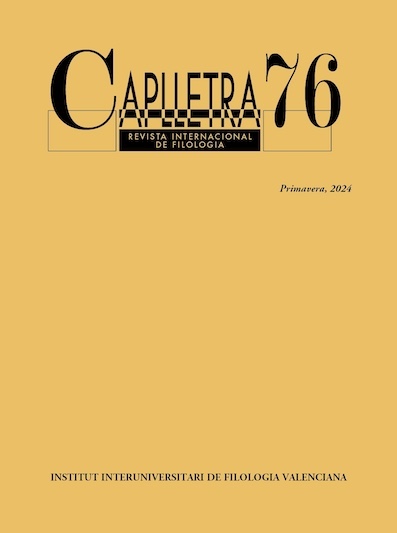The «futuro perfeito» in contemporary european portuguese: semantic change
DOI:
https://doi.org/10.7203/caplletra.76.28216Keywords:
futuro perfeito, temporality, aspect, evidentiality, epistemic modality Abstract
Abstract
The futuro perfeito, a compound tense of the indicative, is traditionally described as a tense that indicates anteriority in the future, having as a point of reference another tense that is also future. Another value referred to by traditional descriptions is the modal of conjecture or uncertainty. Currently, we rarely use this tense with temporal value. It is used, above all, with modal values, namely as mediative, in journalistic discourse, in the news genre, with evidential value: the source of knowledge is not the speaker, who received it from another origin. In contrast with other Romance languages, the futuro perfeito has a reporting value. In European Portuguese, the conditional is not the tense that serves more usually to indicate a reported source of information. The main and most frequent current reporting value seems to stem from the epistemic modal value. Indicating that a proposition refers to facts that happened (which stems from its perfeito aspect value) but not assuming it as necessarily true, this tense configures discursive uses in which a speaker reports statements about specific facts, without taking responsibility for the respective validation.
 Downloads
Downloads
Downloads
Published
How to Cite
-
Abstract176
-
PDF (Català)193
Issue
Section
License
Authors submitting work to Caplletra for publication must be the legitimate holder of the usage rights. Legitimacy for the purposes of publishing the work must also include images, tables, diagrams and any other materials that may complement the text, whether they are the author of such material or not.
Copyright: on publishing their work in the journal, the author grants Caplletra. Revista Internacional de Filologia usage rights (reproduction, distribution and public communication) for both the paper printed version and for the electronic version.
All work published in Caplletra is covered by the Creative Commons license type Attribution-NonCommercial-NoDerivatives 4.0 (CC BY-NC-ND 4.0).
RESPONSABILITY
Caplletra. Revista Internacional de Filologia does not necessarily identify with the points of view expressed in the papers it publishes.
Caplletra. Revista Internacional de Filologia accepts no responsibility whatsoever for any eventual infringement of intellectual property rights on the part of authors.






